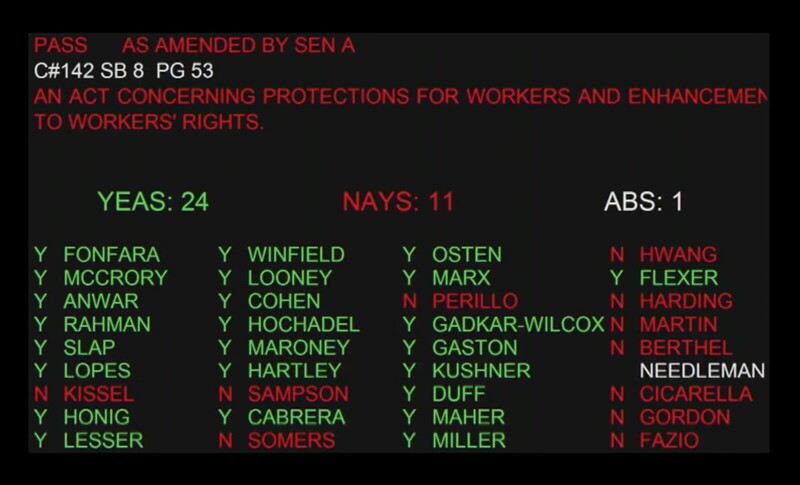2025 State Senate Voting Records

The following table illustrates how members of the Connecticut state Senate voted in 2025 on a series of key bills, either in committee or on the Senate floor.
If a senator sponsored a bill and did not have an opportunity to vote on it, or abstained or was absent, that is also reflected in these records. Bill sponsorship is weighed the same as a vote in calculating legislators’ overall voting scores.
While these bills reflect just a fraction of all legislation addressed during the session, they were chosen as the framework for CBIA’s 2025 legislative voting records based on their potential impact—positive or negative—on job growth and the state’s economy.
Legislators with 100% scores are designated as jobs champions, reflecting their unwavering commitment for policy solutions that make the state more affordable and create opportunities for all residents.
CBIA’s ReimagineCT policy solutions, supported by a bipartisan group of 73 lawmakers representing both major political parties, feature in a number of these bills.
Those solutions reimagine Connecticut’s workforce, economy, and quality of life to build an opportunity economy that emphasizes affordability, meaningful careers, and a positive business climate.
Senate-Voting-Records_20252025 Voting Records: Key Bills
Striking Workers (SB 8): Allows striking workers to collect unemployment benefits, setting a dangerous policy precedent and undermining Connecticut’s economic competitiveness by unfairly tipping the balance between employee and employer. Passed Labor Committee 9-4; Judiciary Committee 25-12; Appropriations Committee 38-12; Senate 24-11; House 87-59. Vetoed by Gov. Ned Lamont. CBIA Position: Opposed.
Health Plans (SB 11): Places costly mandates on self-funded health plans, requiring small businesses using those plans to pay hundreds of thousands of dollars in out-of-pocket medical claims. Passed Human Services Committee 15-7; Judiciary Committee 28-11; Appropriations Committee 37-11. No action taken by Finance Committee. CBIA Position: Opposed.
Occupational Licensing (SB 611): Eliminates application review fees charged by state licensing boards and caps many occupational license fees at $100, removing a major barrier to employment for many Connecticut residents. Passed General Law Committee 22-0; Finance Committee 54-0. No action taken by Senate. CBIA Position: Supported.
Small Business Regulations (SB 1402): Requires state agencies’ existing regulatory flexibility analysis to include whether small businesses may be required to retain records, change or provide an additional employee benefit, or change a product or packaging. Passed Commerce Committee 20-0; Senate 36-0; House 148-0; signed by Gov. Lamont. CBIA Position: Supported.
Hiring Ratios (SB 1465): Allows skilled trades companies held to the 3:1 apprenticeship hiring ratio to apply for an exemption from the Department of Consumer Protection, enhancing workforce development efforts in critical occupations. Passed General Law Committee 21-0; Senate 35-0; House 147-0; signed by Gov. Lamont. CBIA Position: Supported.
Permitting Reforms (HB 6868): Regulatory reforms significantly improve the speed and predictability of environmental permitting processes, improving transparency, predictability, and efficiency—while maintaining strong environmental protections. Passed Environment Committee 27-5; House 144-3; Senate 36-0. CBIA Position: Supported.
Banking Reforms (HB 6877): Cuts red tape by eliminating outdated regulations requiring small and medium-sized banks to obtain approval from the Department of Banking for renovations costing more than $750,000. Passed Banking Committee 12-0; House 145-0; Senate 35-0. CBIA Position: Supported.
Wage Liability (HB 6955): Costly mandate holds general contractors liable for subcontractors that fail to pay wages, allowing employees of subcontractors or unions to bring civil lawsuits against general contractors. Passed Labor Committee 9-4; no action taken by House. CBIA Position: Opposed.
Regulatory Group (HB 7085): Establishes a working group to continuously evaluate the new released-based regulatory framework that replaces the Transfer Act and recommend improvements as they are implemented. Passed Commerce Committee 20-0; House 147-0; Senate 36-0; signed by Gov. Lamont. CBIA Position: Supported.
Workers’ Compensation (HB 7141): Addresses a landmark Connecticut Supreme Court ruling that threatened to hike workers’ compensation costs as much as 265%. While the House did not act on the bill, its provisions were included in another bill that was adopted and signed by the governor. Passed Judiciary Committee 39-0. No action taken by House. CBIA Position: Supported.
State Budget (HB 7287): Two-year, $55.8 billion budget uses fiscal guardrail workarounds and more than $357 million in business tax hikes to increase state spending by $2.6 billion over the next two years. Passed House 99-49; Senate 25-11; signed by Gov. Lamont. CBIA Position: Opposed.
Release-Based Regulations (2025-014A): Adopts sweeping regulatory reform package replacing the outdated Transfer Act, long seen as an economic growth barrier. Reforms are expected to provide predictability for businesses, fueling new investments, job and economic growth, millions of dollars in new tax revenues. Passed Regulation Review Committee 13-0. CBIA Position: Supported.
RELATED
EXPLORE BY CATEGORY
Stay Connected with CBIA News Digests
The latest news and information delivered directly to your inbox.



